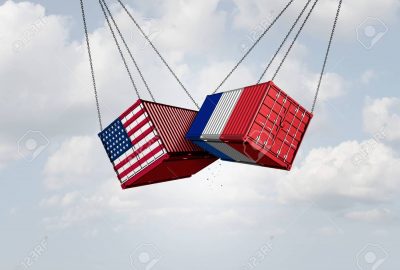US and France on the Brink of Trade War

The geopolitics of the cyber world is again influencing the global political and economic order. Now, a new international tension arises around a digital tax, known as the ‘Google tax’. Such tension could trigger a trade war, this time between the United States and France, which would reduce world GDP, warned the Organization for Economic Cooperation and Development (OECD), after confirming that there will be no agreement between both countries in 2020.
The need to tax virtual services has generated controversy all over the world and has caused the distancing of interests in some of the main world powers. This is precisely the case in the dispute between Washington and Paris. In July 2019, the French Parliament approved the GAFA (Google, Apple, Facebook and Amazon) Tax, which obliges these companies to pay a 3% tax on their revenue with the provision of cyber services. The United States, however, strongly rejected French law and threatened to respond with a tax on wines from the European country. Thus began the discussions that continue to agitate both countries to this day.
The dispute has recently gained even more attention with the rapid advance of the COVID-19 pandemic, as many technology giants have benefited from the extraordinary increase in the use of virtual services, mainly due to the social isolation measures adopted by several countries in all the continents. The situation reached an intolerable level of dispute of interests, with the two parties becoming increasingly irreducible and resistant to giving up their proposals. On October 12, the OECD confirmed that there will be no agreement this year and warned that countries must reach it soon or risk further damaging the world economy.
The result of the failure in reaching an agreement can lift a mere tension of interests for an intense fiscal war. The American restrictions will certainly not be restricted to French wines and will later be applied to other products coming from the European country, which, in turn, should include more companies in the list of the “Google tax”. The result would be detrimental to all sides since the relations between two major global powers would be undermined at a time of great fragility for the world economy.
According to the OECD, the absence of a consensual solution between the US and France could lead to a proliferation of unilateral taxes on digital services and an increase in harmful tax and trade disputes, which would damage tax security and investment in international business, thus creating a chain of sanctions and an obstacle to the development. In other words, we would have the appearance of a new trade war, as significant or more than the current dispute between the US and China, considering that it would affect business between two nations that are members of the “capitalist west” and not two great ideological opponents such as Washington and Beijing.
In its recent statement on the subject, the OECD further confirmed that there is a danger that tensions are not restricted to the US and France, but that they can generate a global trade war. The Organization’s great fear is that the attitude will serve as an example for other nations with conflicts of interest, thus creating a worldwide trend. At the same time, the Organization ensured that the international community agreed to continue working to reach an agreement in mid-2021.
The OECD’s concerns seem somewhat “innocent” when we look at the world scenario in depth. Is it still possible to talk about measures to contain the advance of a more protectionist trend and the proliferation of fiscal and trade wars around the planet? The legacy of the dispute between the US and China is insurmountable: a global trend has been generated that puts an end to the neoliberal ideal of a world without borders and tax barriers. Economic nationalism is on the rise because this is the way in which nations have always tried to overcome moments of crisis: greater economic fluidity – less intervention, greater instability – greater intervention.
At a time of global crisis, with structural changes in the world economic order occurring in an accelerated way, how to talk about stopping tax barriers? Still, with virtual services taking on an increasingly important role for the world economy, how can we prevent nations from taxing them? There is only the possibility of mediating an agreement, but the fight against the proliferation of trade wars is absolutely in vain because this is the way in which the superpowers resolve their conflicts of interest in the contemporary world.
*
Note to readers: please click the share buttons above or below. Forward this article to your email lists. Crosspost on your blog site, internet forums. etc.
This article was originally published on InfoBrics.
Lucas Leiroz is a research fellow in international law at the Federal University of Rio de Janeiro.

